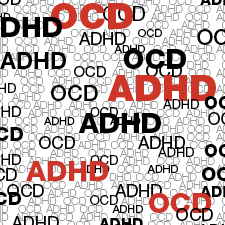It’s not uncommon for people to confuse ADHD and OCD. After all, they are both disorders that affect the brain. However, there are some key differences between them. In this blog post, we will discuss the similarities and differences between ADHD and OCD. We will also provide information on how to get help if you or someone you know is struggling with either of these conditions.
Contents
Defining ADHD
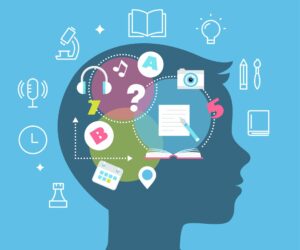 When we say ADHD, the first picture in our mind is a kid bouncing off the walls, unable to focus on anything for more than a few seconds. And while that can be accurate, it’s not always the case. ADHD stands for Attention Deficit Hyperactivity Disorder. It’s a mental disorder that makes it hard to focus, stay still, and control impulsive behaviors. People with ADHD often have trouble in school, work, and social situations.
When we say ADHD, the first picture in our mind is a kid bouncing off the walls, unable to focus on anything for more than a few seconds. And while that can be accurate, it’s not always the case. ADHD stands for Attention Deficit Hyperactivity Disorder. It’s a mental disorder that makes it hard to focus, stay still, and control impulsive behaviors. People with ADHD often have trouble in school, work, and social situations.
The symptoms of ADHD can vary from person to person. Some people with ADHD only have problems with focus, while others may also be hyperactive and impulsive. And while it’s most commonly diagnosed in children, it can also affect adults.
Another notable thing about ADHD is that it’s often comorbid with other conditions, such as anxiety, depression, and substance abuse disorders.
Signs
The obvious and generally assumed symptom of ADHD is hyperactivity. A person with this sign will fidget, talk excessively, dash around, and be unable to sit still for long periods of time. Along with hyperactivity comes impulsivity which can present itself as interrupting others in conversations, blurting out answers before questions have been completed, or having a hard time taking turns. Moreover, people with ADHD often have trouble focusing. This can look like daydreaming, being easily distracted, or appearing forgetful.
A rather strange and often unknown yet dark side to ADHD is what’s called executive functioning problems. These problems can arise in the form of disorganization, poor time management skills, procrastination, and trouble starting or completing tasks. Because of these symptoms, people with ADHD often have a hard time in school and at work. They may also have difficulty keeping friends and maintaining relationships.
Defining OCD
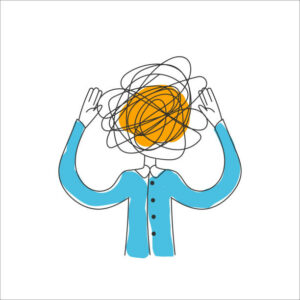 OCD is popular for its portrayal in the media as a quirky and funny disorder. It’s often joked about and made into light of situations when, in reality, it can be a very debilitating mental illness. OCD stands for Obsessive-Compulsive Disorder. It’s an anxiety disorder that causes people to have unwanted thoughts (obsessions) and to do repetitive behaviors (compulsions) to try to control their obsessions.
OCD is popular for its portrayal in the media as a quirky and funny disorder. It’s often joked about and made into light of situations when, in reality, it can be a very debilitating mental illness. OCD stands for Obsessive-Compulsive Disorder. It’s an anxiety disorder that causes people to have unwanted thoughts (obsessions) and to do repetitive behaviors (compulsions) to try to control their obsessions.
It’s important to note that not all compulsions are observable. Some people may have mental compulsions, such as counting in their head or repeating words or phrases over and over again.
Signs
The key symptoms of OCD are in its name: obsessions and compulsions. There are four main types of OCD: contamination, hoarders, symmetry, and ruminations.
- Contamination OCD is when a person is afraid of germs, dirt, or other contaminants. They may wash their hands excessively, avoid touching doorknobs or shaking hands, and clean their house obsessively.
- Hoarding OCD is when a person is unable to throw away any possessions, no matter how useless they may be. They may have a hard time parting with anything, even if it’s garbage. This can lead to their homes being cluttered and crammed full of stuff.
- Symmetry OCD is when a person has an obsession with balance, order, and symmetry. They may need to have everything in their line of sight perfectly arranged. They may also have compulsions such as tapping or touching things a certain number of times or stepping on and off the sidewalk in a precise way.
- Ruminations OCD is when a person obsessively thinks about something, sometimes for hours at a time. This can be about anything, such as their health, a past mistake, or a future worry. They may try to “solve” their problem by constantly thinking about it.
These are only a few examples. You will feel appalled to know that there are over 20 types and subtypes of OCD, each with its own set of distinctive features.
Similarities
ADHD and OCD, while different disorders, do share some similarities.
- The very first overlap between the two disorders is that they’re both neurobiological. This means that they’re caused by problems with the brain and central nervous system. Both disorders can also run in families, which suggests that there may be a genetic component to both ADHD and OCD.
- In terms of symptoms, both disorders can cause people to have trouble focusing and paying attention. Both can also cause impulsivity and hyperactivity.
- As mentioned earlier, ADHD can sometimes cause executive functioning problems, which are similar to the compulsions seen in OCD.
- Another clashing property of the two disorders is that they both involve unhealthy preoccupation with thoughts. In ADHD, hyper fixation can cause a person to become overly focused on one thing to the point where it’s all they can think about. This can look like an obsession. In OCD, obsessions can cause a person to have intrusive and unwanted thoughts that they can’t get out of their head.
- Another similarity between the two disorders is that they’re both chronic, meaning they can last for years or even a lifetime.
All of these make it hard for people with either disorder to live a “normal” life. They can both cause problems in school, work, and social situations.
Differences
There are several key differences between ADHD and OCD.
- The most notable one is that people with ADHD generally do not have obsessions, only compulsions. This means that they may have a hard time focusing and be easily distracted, but they will not be obsessively thinking about something.
- Another difference is that people with ADHD are often impulsive, while people with OCD generally are not. This means that people with ADHD may act on their impulses without thinking, while people with OCD will often carefully consider their actions before taking any steps.
- People with ADHD may also have obsessive thoughts and behaviors. However, these are not as severe or as time-consuming as they are in OCD.
- Lastly, people with ADHD may have a hard time starting or completing tasks, while people with OCD will often have a hard time stopping their compulsions once they start them. This means that people with ADHD may procrastinate or be disorganized, while people with OCD may appear to be stuck in a cycle of repetitive behaviors.
These differences are what make ADHD and OCD two distinct disorders.
Dealing With Both At The Same Time
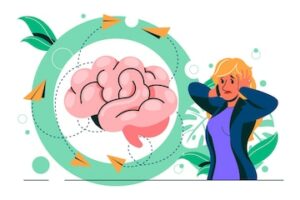 The comorbidity of ADHD and OCD can make life very difficult for those who have to deal with both disorders. This is because the symptoms of each disorder can exacerbate the symptoms of the other. It can also become a matter of which disorder to treat first. The contradictory nature of the symptoms of these can manifest in various ways. Let us understand these through examples.
The comorbidity of ADHD and OCD can make life very difficult for those who have to deal with both disorders. This is because the symptoms of each disorder can exacerbate the symptoms of the other. It can also become a matter of which disorder to treat first. The contradictory nature of the symptoms of these can manifest in various ways. Let us understand these through examples.
- A person with ADHD may be prescribed medication to help them focus. However, this same medication can increase the risk of compulsions and obsessions in people with OCD.
- People with OCD may try to use compulsive behaviors to cope with their ADHD symptoms. For example, a person with both disorders may excessively clean their house in an attempt to focus and organize their thoughts.
- Moreover, the process of seeking help for one disorder can be complicated by the other. For example, a person with ADHD may not be diagnosed with OCD because their symptoms of impulsivity and hyperactivity may be attributed to their ADHD. Or, a person with OCD may not be diagnosed with ADHD because their compulsions may be mistaken for a “coping mechanism” for their anxiety.
It is important to remember that each person experiences these disorders differently. It can be a difficult balancing act to manage both disorders at the same time. However, it is possible to live a full and happy life with both ADHD and OCD. The important thing is to seek professional help and create a treatment plan that works for you.
Treatment Options
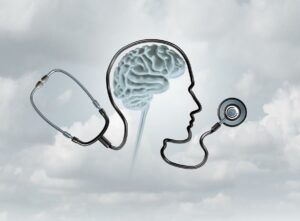 Treatment for comorbidity ADHD and OCD generally includes a combination of medication and therapy.
Treatment for comorbidity ADHD and OCD generally includes a combination of medication and therapy.
- Stimulant medications are the most common type of medication used to treat ADHD. These include drugs like methylphenidate (Ritalin) and amphetamines (Adderall). While these medications can be effective in treating ADHD, they can also worsen OCD symptoms. Therefore, it is important to carefully monitor the side effects of these medications.
- Non-stimulant medications are also an option for treating ADHD. These include drugs like atomoxetine (Strattera) and guanfacine (Intuniv). These medications generally have fewer side effects than stimulants, but they are not as effective in treating ADHD.
- Therapy is also an important part of treatment for comorbidity ADHD and OCD. Cognitive behavioral therapy (CBT) is a type of therapy that has been shown to be effective in treating both disorders. CBT can help people with ADHD learn how to manage their symptoms and it can help people with OCD learn how to control their compulsions.
- There are also a variety of alternate treatments that can be effective in treating comorbidity ADHD and OCD. These include things like omega-three supplements, acupuncture, and meditation.
Medication and therapy can be effective in treating comorbidity ADHD and OCD. However, it is important to find a treatment plan that works for you. Each person experiences these disorders differently, so what works for one person may not work for another.
Conclusion
To conclude the above, ADHD and OCD are two distinct disorders that share some similarities. However, they also have many differences. These can make life very difficult for those who have to deal with both disorders. This is because the symptoms of each disorder can exacerbate the symptoms of the other. It can also become a matter of which disorder to treat first. The most important thing is to find a treatment plan that works for you. Comorbidity ADHD and OCD can be difficult to live with, but there are many resources available to help you manage your symptoms.
If you or someone you know is looking for psychological help, Therapy Mantra is here for you. We are the leading providers of online therapy and counseling. Our team of highly trained and experienced therapists can provide assistance at the most affordable rates. Contact us today to learn more about our services. You may also visit our website to book an online therapy session or download our free Android or iOS app for more information.
